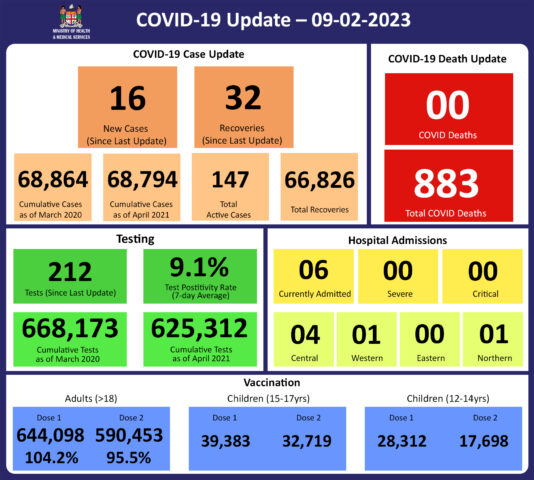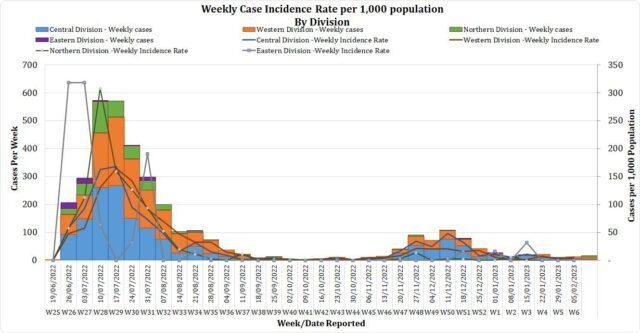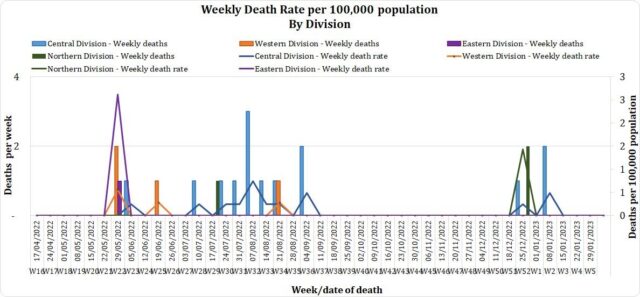COVID-19 Update 09-02-2023
COVID-19 Update
Thursday 09th February
| Transmission Update:
Since the last update on 02/02/23, we have recorded 16 new cases. Of the 16 new cases recorded, 1 case was recorded in the Central Division; 14 cases in the Western Division; 1 case in the Northern Division with nil cases in the Eastern Division. The national 7-day rolling average of cases as of 5th February is 3 daily cases. The Central Division cases constitute 66% of the cumulative total cases nationally, with the Western division making up 28%, 4% in the Northern Division, and 2% in the Eastern Division. |
||||||||||||||||||||||||||||||||||||||||||||||||||||||||||||||||||||
| Deaths:
The curve depicts weekly COVID-19 deaths by division since May 2021. It indicates a surge from last December, with peaks in mid-January 2022 followed by a downward trend. COVID Death Reports We have no (0) new COVID-19 deaths to report. Analysis of COVID-19 Deaths Table 1: Death rates by Division
An analysis of the 182 deaths recorded since December 2021, shows that the Central Division has the highest absolute number of deaths. The Northern Division has the highest rate of death when adjusted for population. Table 2: Deaths by Age Group
The death rate adjusted per 100,000 population, has been highest in the age group 50 years and over for the 182 deaths since December 2021. There were ten (10) deaths below the age of 19 years, 7 out of the 9 children had significant pre-existing medical conditions, and three (3) children had no known underlying medical condition. Table 3: Deaths by Vaccination Status
Of the 182 COVID-19 deaths reported since December 2021, eight (8) deaths were in the population not eligible for vaccination (under the age of 12). An analysis of the 174 deaths in the vaccine-eligible population revealed that Fiji has a death rate of 12.4 per 100,000 population for fully vaccinated adults and 344.4 per 100,000 population for unvaccinated adults. This means that unvaccinated adults in Fiji have been dying at a rate 27.8 times higher than fully vaccinated adults. Individuals in the 12-17 age group who died were not vaccinated. There has been a total of 883 deaths due to COVID-19 in Fiji. As of December 25th, 2022, the national 7 days rolling average for COVID-19 deaths per day is 0.0 with a case fatality rate of 1.28%. Due to the time required by clinical teams to investigate, classify and report deaths, a 4-day interval is given to calculate the 7 days rolling average of deaths, based on the date of death, to help ensure the data collected is complete before the average is reported. We have also recorded 1,006 COVID-19-positive patients who died from other serious medical conditions unrelated to COVID-19; their doctors have determined that COVID-19 did not contribute to their deaths, and therefore these are not classified as COVID-19 deaths. |
||||||||||||||||||||||||||||||||||||||||||||||||||||||||||||||||||||
| Hospitalisation:
Currently, we do not have any (0) admissions as a direct cause of COVID-19. However, six (6) admissions have tested as covid positive but are admitted for other diseases. Patients presented to the hospital are tested before admission therefore, a high number of people who are admitted for non-covid health conditions, test positive for COVID-19 due to the current level of transmission in the community. Using the WHO clinical severity classification, there are 100% (n=6) cases in the asymptomatic and mild categories; with nil cases in the moderate, severe and critical categories. |
||||||||||||||||||||||||||||||||||||||||||||||||||||||||||||||||||||
| Testing:
4 tests had been reported for 9th February 2023. The total cumulative tests since 2020 are 668,173 tests. And the 7-day daily test average is 30 tests per day or 0.0 tests per 1,000 population. The national 7-day average daily test positivity is 9.1%, which is above the WHO recommendation of 5% and indicates the ongoing community transmission in Fiji. |
Public Advisory
Our surveillance systems show an increase in reporting of influenza-like illness and acute respiratory illnesses since early December. We have always known that the early part of each year is considered our flu season. Influenza lab testing indicates the same trend and that we are now seeing an increase in a type of Influenza A scientifically labelled as FluA/H1 Pdm. This has been isolated in some of the severe cases seen in the 3 major hospitals. Most patients are above the age of 40 and have a number of comorbidities.
We have also seen a number of severe COVID diseases in this current outbreak which we reported as starting from mid-November and is currently on a decreasing trend. We reported 5 deaths. All the deaths occurred in elderly people who presented late and had a number of comorbidities. Consistent with past trends the deaths have occurred toward the tail end of the wave as it does take weeks for the disease to get to the vulnerable and less mobile members of the population.
The recent adverse weather has also resulted in an increase in LTDD however severe disease has not been marked as in previous years.
The Ministry of Health released public advice on the 3rd of January 26, 2023, regarding this and it is once again attached to this statement.
Public Advisory released on 03/01/2022: Minimise movement and consider wearing face coverings when going out if feeling unwell
Furthermore, we have Tamiflu (antiviral medications) stock which is being distributed and we are sourcing Flu vaccines which will be offered to those vulnerable to the severe effects of Influenza and to frontline staff. Surveillance has also been escalated and we await more recent reports to determine ongoing trends. We also working with WHO to increase our stocks of flu testing reagents and consumables.
For COVID-19;
Our data indicate that we currently have a high level of immune protection given the low impact the current wave is having on admission capacity.
There is a continuing report of COVID-19 cases however our case numbers are declining and likewise absenteeism rates from selected industries. However, we have registered (ten) 10 patients who have incidentally tested positive for COVID-19 while admitted to the hospital. Correspondingly, we continue to focus on implementing COVID safe measures around those vulnerable to the severe effects of COVID-19. This includes escalating measures in hospitals, old people’s homes and facilities catering for disabled persons. As such we expect to escalate screening protocols and masking for staff, patients and visitors. Furthermore, visitor restrictions will be in place.
For the general public, we are advising that the elderly, those with chronic disease, and children with disabilities need to receive 4 doses of the vaccine and measures need to be taken to ensure they are brought to the hospital early if there is an early indication of feeling unwell, especially with respiratory symptoms. Furthermore, COVID safe measures need to be instituted around the elderly, those with chronic disease, pregnant mothers and children with disabilities. This involves proper masking of those caring for vulnerable persons, safe physical distancing for those visiting them, and ensuring they engage in highly ventilated spaces when they venture out of their homes. It is important for those with chronic diseases to be on proper treatment that ensures the optimal control of their diseases. This means that diabetics need their blood sugar to be as near normal as possible, hypertensives need their blood pressure well controlled and those with cardiac conditions to be as symptom-free as possible.
Consistent with the experience in other countries with high vaccination rates, we anticipate a manageable impact in hospital admissions for COVID-19 disease despite increasing case numbers. While immune protection from the severe disease remains, there is expected to be some immune escape capability that makes the variant more transmissible. The elderly, those with chronic diseases, pregnant mothers and children with disabilities need to be closely watched in this regard.
We emphasise the point that strengthening our ability to live with COVID means we remain vigilant, maintain community-wide adoption of COVID safe measures where appropriate, and keep the impetus for immunisation This is the only means to reduce the disease spread and protect those in the community who are less able to fend for themselves.
Before noting the recent increase in COVID cases, we had initiated rescinding some COVID-related public health measures relating to nightclubs, churches, sporting events and high-risk businesses. The decision to relax public health measures is based on the low number of admissions and severe cases despite the current changes in case numbers. The planned relaxation of public health measures will not have any adverse effect in terms of the number of severe COVID cases we expect to see from the recent increase in case numbers.
Also, anyone who falls sick should not be attending work or school, especially if they have COVID-19-like symptoms. You must get tested for COVID-19, and if tested positive, 7-day isolation is mandatory.
COVID-19 Vaccination
We have been reporting that 100% of our estimated adult population have received one dose and 95% have received the second dose. The vaccination of our target population has been progressing well with the 12 years and above coverage rate for Fiji being 99% for Dose 1 and 89% for Dose 2.
Furthermore, as of the 08th of February, 170,867 (54.6%) booster-eligible individuals have so far received their 3rd dose while 29,208 individuals have been administered the 4th dose.
Increasing Vaccine Booster Coverage Program
We urge the public to get booster vaccine doses at the vaccination site closest to them and the list of sites is provided daily by the MHMS. Currently, both Pfizer and Moderna are recommended for booster doses.
To optimise coverage, our current target of the booster campaign is to administer the Pfizer vaccine to those who have completed the primary series (doses 1 and 2) three or more months prior but have not yet received a booster dose.
COVID-19 booster priority populations are;
- Persons over the age of 18 years who have completed their primary series > 3 months prior can receive their 1st booster dose
- Immunocompromised persons and those over the age of 60 years who had received the 3rd booster dose, may receive the 4th dose after a period of 4 months
- Healthcare workers, port staff, tourism and others who wish to receive a 2nd booster dose may receive it after an interval of 4 months from their first booster dose.
- Anyone over 18 years who have taken their 1st booster dose can receive a 2nd booster dose after an interval of 4 months.
To register online for the first dose, please visit vra.digitalfiji.gov.fj
The public is reminded that vaccination sites strictly close at 3 pm. Therefore, any person going to the site in the afternoon is requested to be present at least by 1.30 pm.
Sites for vaccination will be operational from 9 am – 3 pm each day (Monday – Friday) while Suva Health Center will also operate on Saturdays (9 am – 3 pm).
The list of sites is available at: bit.ly/35Fozux
Last Updated on 1 year by Publishing Team



